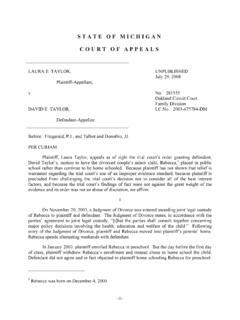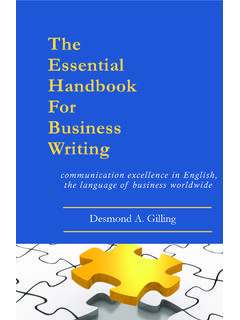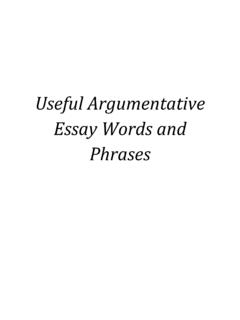Transcription of Top 10 Phrases Not to Use in a Contract- A Lesson from Dr ...
1 Plain LanguageTop 10 Phrases Not to Use in a Contract- A Lesson from Dr. FrankensteinBy David T Dalyhen a lawyer drafts a contract, thecreative process is more like 's than like God's. In-stead of creating something out of noth-ing, we take whatever parts we can findand try to knit them together into a co-herent I remember the story, Dr. Franken-stein's creation turned into a monster be-cause his assistant, Igor, gave him a criminalbrain instead of a normal one. We lawyerscan learn a Lesson from this. In draftingcontracts, we need to carefully scrutinizethe parts other attorneys give us, and re-ject those that aren't going to work the years, I've had the privilege ofworking with many fine lawyers and cli-ents in drafting, reviewing, and negotiatingcommercial contracts. I've also seen myshare of drafting monstrosities. From thisexperience, here is my list of the top 10common contract Phrases that we shouldreject because they impede saying whatneeds to be said-clearly and Naming a contract"Agreement" and nothing moreOne of the most important things a con-tract drafter can do is give the contract aspecific, descriptive title.
2 For example, your"Plain Language" is a regular feature of the Mich-igan Bar Journal, edited by Joseph Kimble for theState Bar's Plain English Committee. The assistanteditor is George Hathaway, chair of the Committee seeks to improve the clarity of legalwriting and the public opinion of lawyers by elimi-nating legalese. Want to contribute a plain Englisharticle? Contact Prof. Kimble at Thomas Cooley LawSchool, Box 13038, Lansing, MI 48901. For in-formation about the Plain English Committee, see ourweb site-wwwmichbar org/committees/ will probably find the title "WidgetSales & Services Agreement" more helpfulthan the simple title 'Agreement." Addinga good title takes little time for the drafter,but it can greatly help a reader understandwhat the contract is once had to search 20 boxes of docu-ments to find a particular contract. Duringmy search, I found dozens of contract draftstided simply 'Agreement" before I found theone I was looking for.
3 How much time andeffort it would have saved if the draftershad given each contract a descriptive title!2. "Agreement" as a defined termSparingly used, definitions are a usefultool in drafting a clear, concise there is one definition that we can al-most always do without: the defined term'Agreement" (referring to the contract it-self). Since the word 'Agreement" is vague,lawyers often create a defined term, the'Agreement."When you refer to your contract, use thewords "this contract" (not defined) lawyers and their groupies use theterm 'Agreement." The word "contract" isalso more precise than "agreement," sinceall contracts are agreements, but not allagreements are "Now, therefore, in considerationof the foregoing and the mutualpromises and covenants hereincontained, the receipt andsufficiency of which is herebyacknowledged, the partieshereby agree as follows:"A good contract clearly explains eachparty's consideration.
4 Usually, one partysupplies goods or services, and the otherpays money. If the consideration is clear,the phrase quoted above is unnecessaryand should be omitted. If the considerationis not clear, it's risky to rely on this for-malistic statement to fix the a display window in the front of adepartment store, the space on the firstpage of a contract is precious for its valueto attract and hold the reader's attentionand to tell the reader what the contract isabout. You shouldn't waste it on emptyboilerplate "The parties [expressly] agree"Presumably, the parties agree to every-thing in the contract, or they wouldn't signit. You should just set out the parties' rightsand duties, without repeatedly saying "theparties sometimes use the phrase "theparties expressly agree" to emphasize theidea that follows. It has the effect of saying"and I really mean it!" But unfortunately,using the phrase "the parties expresslyagree" to create emphasis implies that otherstatements in the contract are less impor-tant.
5 If an idea needs emphasis, considerinstead whether you can create that em-phasis by reorganizing the contract, or byworking out the idea in greater "Unless otherwise agreed"The phrase "unless otherwise agreed" islogically unnecessary so long as the par-ties remain free to amend the contract. Youmay, however, want to use it sparingly toindicate a section where the parties specif-ically expect a change, such as for pricesDavid Daly is an attorney with DaimlerChryslerCorporation, where his practice concentrates on in-ternational and domestic business transactions. He isthe winner of three Clarity Awards for Clear LegalWriting from the Plain English Committee of theState Bar of Michigan. He received his degrees from the University of Michigan in1986, and his in Mathematics and Music fromKalamazoo College in BAR JUUKNAL FEBRUARY 1999 MICHIGAN BAR JOURNALFEBRUARY 1999 PLAIN LANGUAGEor credit terms that may vary from timeto time.
6 When you do, you will probablyalso want to specify how the change willbe course, you could add the phase "un-less otherwise agreed" to every sentencein the contract. The danger is that if youinclude "unless otherwise agreed" in somesentences but not in others, you may cre-ate the implication that some sentences canbe amended orally, or in some other waythat does not constitute a formal "Hereby"Always eliminate this unnecessary have been looking for the last few yearsto find an example of a necessary hereby,and I am still looking. In his Dictionary ofModern Legal Usage, Bryan Garner statesthat "hereby is often a flotsam phrase thatcan be excised with no loss of meaning."Garner adds that "here- and there- in legal writing (unfortunately theydo not occur just here and there), usuallythrown in gratuitously to give legal docu-ments that musty smell'27. "Notwithstanding anything inthis contract to the contrary"This phrase indicates that the writerdoesn't know what the rest of the con-tract says, or how the provision in ques-tion relates to the rest of the contract.
7 In-stead of using this crutch phrase, createthe sense of priority and emphasis throughgood contract organization. Eliminate theinconsistency. At the least, specify, bynumber, which provision overrides whichother "Written notice"It is better to say-once in the noticeprovision-that all notices must be in writ-ing. Then delete the word "written" wher-ever it appears in connection with eliminates redundancy and avoids theunfortunate implication that there is morethan one kind of notice. If one contractsection says that a party must give "writ-ten notice" but another section says that aparty must give "notice," the differencecould logically be interpreted to imply thatthe latter notices may be "Headings used in thisAgreement are included forconvenience of reference onlyand shall not constitute a partof this Agreement for any otherpurpose and will have no forceor effect in the constructionof this Agreement."Like a good contract title, carefully cho-sen section headings greatly help the readerto understand a contract.
8 Therefore, choosesection headings as carefully as the textof the contract. A provision to the effectthat section headings don't count is a poorsubstitute for good headings that do infact guide the reader. It also adds unnec-essary words-words that don't help thereader understand the contract's substan-tive "In witness whereof,the parties have causedthis contract to be executedby their duly authorizedrepresentatives."Eliminate this needless phrase and, in-stead, just jump to the signature lines. Ifa contract signer is not duly authorized,this statement doesn't fix the problem (ex-cept that it may make an unauthorizedsigner personally liable for the contractobligations).Of course, authorization is there is any doubt about whether asigner is duly authorized, have the otherparty show due authorization through asource outside the contract (for example,by having the company's secretary providea certificate of incumbency and certifiedboard resolution approving the contract).
9 ConclusionObviously, clear legal writing goes farbeyond any short list of dos and don'ts. Ihope this list challenges you to reject anyclause that doesn't help make your contractclear and concise. Learn that simple les-son from Dr. Frankenstein. If you scruti-nize contract forms carefully, you'll neverlook at the contract you've just written andsay, "I've created a monster!"[Please send your questions and com-ments to the author at dtd@daimlerchrys-lercoma] UFootnotes1. Garner, A Dictionary of Modern Legal Usage(2d ed), p Id. at Securities and Exchange Commission, APlain English Handbook (Bowne, 1998).Bryan A. Garner, Advanced Legal Drafting (Law-Prose, Inc., 1994).John P. McCulloch and Michael J. Mayette have been awarded theAccredited in Business Valuation (ABV) designation by theAmerican Institute of Certified Public Accountants (AICPA).Not only that, we also do Asset Appraisal, Business Valuation,Estate & Gift Tax, ESOP's, Marital Dissolutions,Condemnation, Litigation Support, Business Interruption and Lost diversified staff can help you with all of your business and tax related us a call.
10 It'll probably be the best money you've ever Mayette<,- Compa, " P. PUBLIC ACCOUNTANTS & MANAGEMENT CONSULTANTS26862 Woodward Ave., Suite 200 -Royal Oak, Michigan 48067 248 / 544 / 4400 Fax 248 / 544 / 3003E-mail: Web site: P. Mculc, *1B Mihe J .MaetCA/FEBRUARY 1999 MICHIGAN BAR JOURNALFEBRUARY 1999 MICHIGAN BAR JOURNAL



















